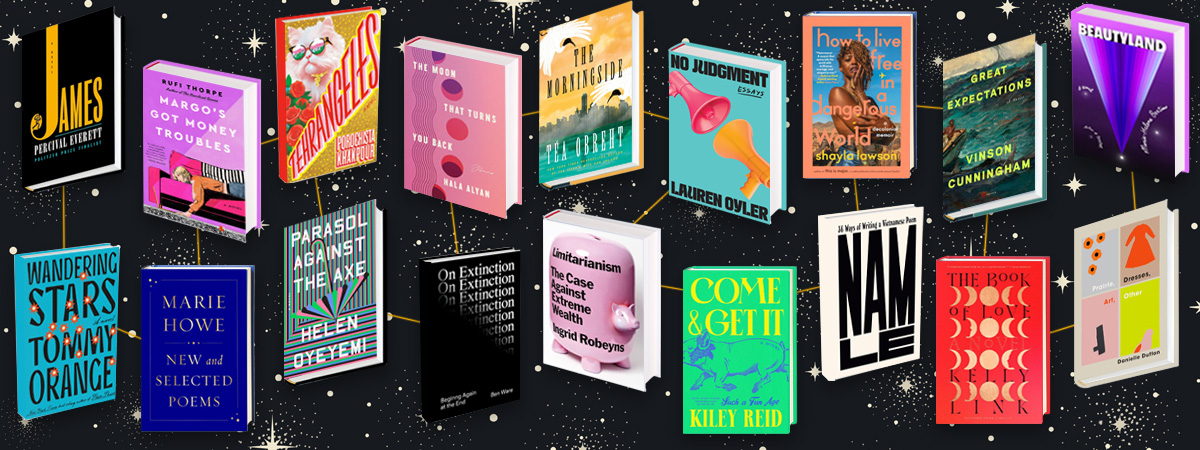
Lit Hub’s Most Anticipated Books of 2024
230 Books We’re Looking Forward to Reading This Year
APRIL
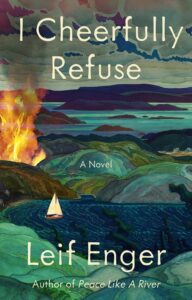
Leif Enger, I Cheerfully Refuse
Grove, April 2
“Set in a not-too-distant America, I Cheerfully Refuse is the tale of a bereaved and pursued musician embarking under sail on a sentient Lake Superior in search of his departed, deeply beloved, bookselling wife.” Honestly say no more: this book sounds funny, strange, and absolutely wonderful. –DB
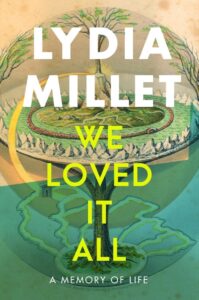
Lydia Millet, We Loved It All: A Memory of Life
Norton, April 2
This is an exciting literary event: Lydia Millet’s first book of nonfiction! Earning a place alongside the classics of conservation writing, Millet urges readers to think of themselves as part of a larger tapestry, one that has already seen countless species pushed out of existence to accommodate human concerns. Millet’s awe of nature is catching, even as it lives alongside the grief of our everyday destructions. Pre-order it now for your Earth Day reading. –ES
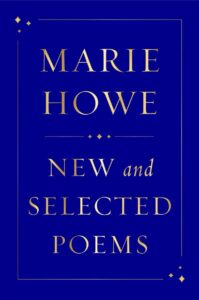
Marie Howe, New and Selected Poems
W.W. Norton, April 2
Finally, one will be able to find all their favorite Marie Howe poems in one place. In April, this new collection will encompass all four of Howe’s previous books, as well as a selection of new poetry. It’s been since 2018 when the stunning Magdalene was released that we’ve had new Marie Howe poems: a fiercely loved poet with cult classic poems such as “What the Living Do”, this will be cause for celebration for many Howe-obsessives out there, including yours truly. –JH
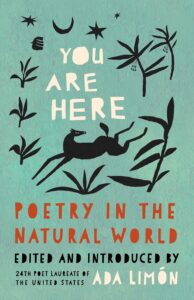
Ada Limón, ed., You Are Here: Poetry in the Natural World
Milkweed, April 2
Ada Limon, 24th Poet Laureate of the United States, is someone who’s taste in poetry I trust absolutely. Her own work is glimmering and heart-rendering, much of it in conversation with place, creatures, nature as a whole, and she has now edited a collection about just this very thing. You Are Here brings together poems that reflect on our relationship to nature, by over fifty of our most renowned poets, such as Joy Harjo, Jericho Brown, and more. With an introduction by Ada herself, this promises to be a sure delight. –JH
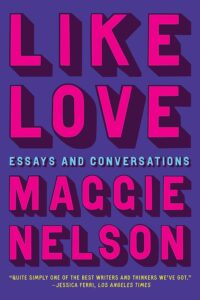
Maggie Nelson, Like Love: Essays and Conversations
Graywolf, April 2
There are a couple authors and artists out there that I am distinctly grateful to be alive alongside, and Maggie Nelson might be at the top of that list. She’s someone whose mind I trust to tackle the hard, complicated subjects of our age, as well as the long-lasting, eternal ones, like love, for example. This new book of Nelson’s is a collection of her writing on the subject, as well as interviews, conversations, and more, all from the last twenty years: a myriad and immersive look at the way this subject has been woven into her life, relationships, and work. The topic is infinitely compelling, the medium is new and different: it all makes for a stunning and integral book on the topic. I know I’ve had a quote of her’s about just this very thing rattling around in my brain since I read the interview in 2015:
Bookforum: [That reminds me of] a line from a Cassavetes film. The line is—and so, I want to ask you—Do you believe that love is a continuous stream?
Maggie Nelson: I guess the parser in me would have to ask, what do you mean by “love,” and what do you mean by “stream”? But another part of me says, right off the bat, absolutely. –JH
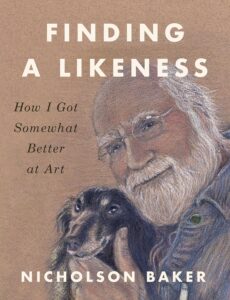
Nicholson Baker, Finding a Likeness: How I Got Somewhat Better at Art
Penguin Press, April 2
I adore an account of trying to do something for which one doesn’t have a natural aptitude. There’s nothing more human than making small amounts of incremental progress toward a skill that isn’t strictly necessary for survival. I can think of no writer whose account of spending years attempting to improve at painting I would more relish than Nicholson Baker. I have no doubt this will be a work full of charm and wisdom, in equal measure. –JG
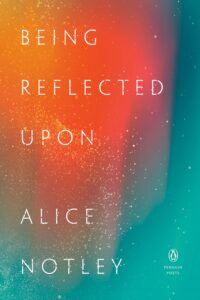
Alice Notley, Being Reflected Upon
Penguin Books, April 2
It is indeed fitting that one of America’s great poets, Alice Notley, should write a memoir in verse. (One could certainly argue that any given poet’s body of work is a kind of memoir, life as a series of moments seen and felt.) Though focused on Notley’s time in Paris from 2000 to 2017, where she underwent treatment for breast cancer, many of the poems in Being Reflected Upon move backwards in the artist’s life—her childhood in California, formative years roaming through Europe—to create a metaphysical portrait in glances, of a restless poetic consciousness concerned with life, death, and everything in between. –JD
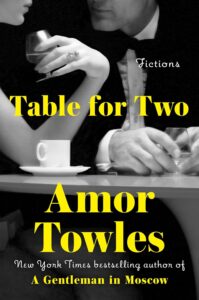
Amor Towles, Table for Two
Viking, April 2
Fair to describe Amor Towles as a master of the novel; here, he combines stories from the 2000s that touch on the “delicate mechanics of compromise that operate at the heart of modern marriages,” as well as a novella based around a character from Rules of Civility, extending the thought into the Golden Age of Hollywood. –JM
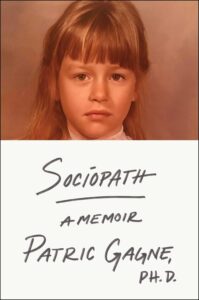
Patric Gagne, Sociopath: A Memoir
Simon & Schuster, April 2
It can feel, in the age of TikTok psychology, that sociopathy is something that only exists in AITA forums and viral Thanksgiving dinner Twitter threads, both over-ascribed and under-explored. Gagne plumbs the depths of the condition, starting from childhood, when she realized other people’s reactions to her were off. She is told by doctors that there is no treatment for the condition, and doesn’t have much hope until she connects with an old boyfriend, realizing that if she is capable of love, then perhaps there is more to her psychology than specialists had allowed for. –JM
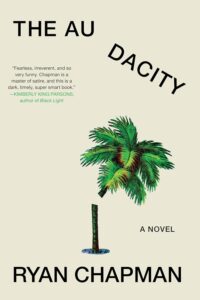
Ryan Chapman, The Audacity
Soho Press, April 2
A hilarious leap into the dark depths of the world’s wealthiest, as Guy Sarvananthan weathers the fall-out from his wife’s start-up’s Theranos-esque collapse—and decides, instead of trying to do the right thing, to fly to a private Caribbean island for a billionaire philanthropy summit. Amitava Kumar calls it “Martin Amis’s Money for really late, late capitalism” and Chapman’s sharp humor earns him that place among the master satirists. –DB
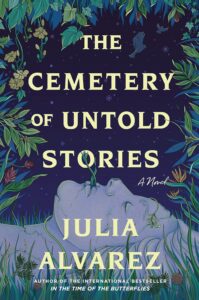
Julia Alvarez, The Cemetery of Untold Stories
Algonquin, April 2
By her own admission, Julia Alvarez never liked the role of spokesperson, but it’s hard not to think of her as one of the grand dames of a generation of American authors writing in English, or a mixture of English and Spanish, that includes Cristina García, Sandra Cisneros, and others. In her latest, Alvarez’s protagonist Alma tries to shrug off years of untold stories by literally burying them in an empty plot in the Dominican Republic, but, it wouldn’t be a Julia Alvarez novel if it was as easy as that. You just can’t keep a good ghost underground. –SR
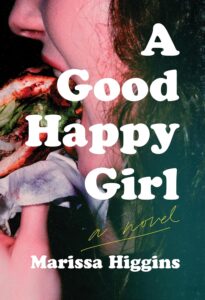
Marissa Higgins, A Good Happy Girl
Catapult, April 2
Who among us can say no to a messy queer novel? Certainly not me. When Helen, an anxious attorney struggling with her childhood trauma, starts hooking up with lesbian couple Catherine and Katrina, she thinks sex will be a good distraction from her life. But things with Catherina and Katrina quickly spiral out of control. What was once a fun hook up is now an emotional and sexual vortex. Meanwhile, Helen’s being pulled back into her family drama and forced to face her past. Any book that lets me use the phrase “sexual vortex” while describing it is definitely a great read. –MC
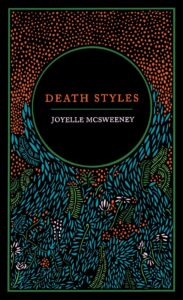
Joyelle McSweeney, Death Styles
Nightboat, April 2
In response to the death of her infant daughter, McSweeney set out to write a poem a day. With references ranging from River Phoenix, Mary Magdalene, a backyard skunk, and Terminator 2, McSweeney proposes a link between style and survival, even in the gravest of circumstances. “Death Styles navigates the opposing forces of survival and grief, finding a way to press against death’s interface, to step the wrong way out of the grave.” –EF
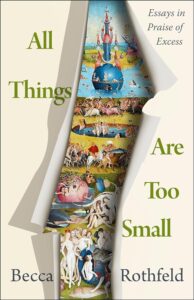
Becca Rothfeld, All Things Are Too Small: Essays in Praise of Excess
Metropolitan Books, April 2
Good rule of thumb for your internet browsing: if you see Becca Rothfeld’s byline, you should actually read the article. I’m especially looking forward to doing the equivalent of clicking on this collection of essays (please save me from this metaphor), which rejects the idea that we should all be winnowing ourselves down to our cleanest, most mindful, most decent selves, but rather embracing our darkness and wildness, both in aesthetics and in culture. Tell me about it. Bring on the excess, and bring on the muck! –ET
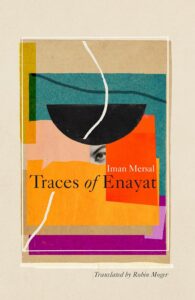
Iman Mersal, tr. Robin Moger, Traces of Enayat
Transit Books, April 2
In this “biographical detective story,” distinguished Egyptian poet Mersal traces the short life and sputtering legacy of the writer Enayat al-Zayyat, who committed suicide before her first novel was even published, and in the process, wanders through her own biography. Originally published in Arabic in 2019, Traces of Enayat won the Shaykh Zayed award in 2021, and happily comes to our shores this year. –ET
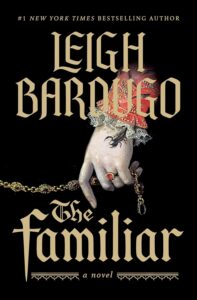
Leigh Bardugo, The Familiar
Penguin Books, April 9
I love Leigh Bardugo’s dark and twisted brain—Ninth House is the best adult fantasy novel I’ve read in a long, long time—so will I follow her to a historical fantasy novel set in the Spanish Golden Age, featuring a servant versed in minor miracles and an immortal familiar? In a heartbeat. –ET
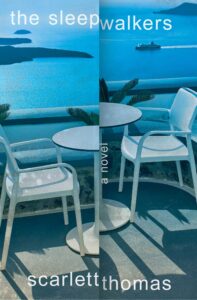
Scarlett Thomas, The Sleepwalkers
Simon & Schuster, April 9
I’ve no idea why Scarlett Thomas isn’t more widely read on this side of the pond—her writing is consistently funny and weird and crystalline. I’ll read pretty much anything she writes, but I’m especially excited for this latest novel, which is set on a Greek island and being pitched as Patricia Highsmith meets White Lotus. Um, yes please. –ET
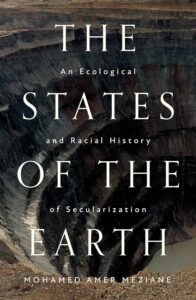
Mohamed Amer Meziane, The States of the Earth: An Ecological and Racial History of Secularization
Verso, April 9
It is not hard, when looking at the big picture, to draw a line from the Industrial Revolution to 19th-century global colonialism to post-war consumer capitalism, and right on through to the current climate crisis. But things get a little more complicated the closer you look. With The States of the Earth, Mohamed Amer Meziane zeroes in on the half-life of western secularism, investigating the centuries-long fallout of replacing one kind of religion with another: racialized capitalism. –JD
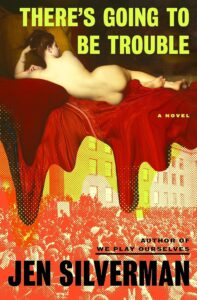
Jen Silverman, There’s Going to Be Trouble
Random House, April 9
Fresh off her latest celebrated play (Spain), Silverman returns to fiction with two entwined stories of love and activism. Set both in the 60s and the present, There’s Going to Be Trouble makes personal that old adage about how not knowing history makes you doomed to repeat it, when a woman discovers that her father wasn’t always the private and demure man he is now but rather caught up in the swirl of the late 60s and the protests against Vietnam. –DB
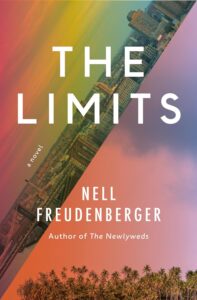
Nell Freudenberger, The Limits
Knopf, April 9
The celebrated Freudenberger’s latest, after her grief-and-science novel Lost and Wanted, is a COVID-and-climate-change book, bringing a precocious and rebellious teen together with her schoolteacher stepmother and one of her stepmother’s teen-parent students for a luminous look at the pandemic era and what it taught us about intimacy. –DB
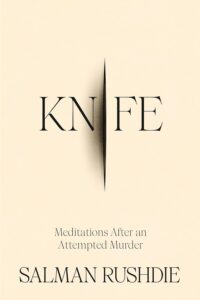
Salman Rushdie, Knife
Random House, April 16
Salman Rushdie spent a bleak decade in hiding across the UK and the US after the Ayatollah Khomeini declared a fatwa in 1989 following the publication of The Satanic Verses. Some thirty years later, Rushdie found himself in a much improved position: he attended literary events, and from time to time he’d pop up in Brooklyn bars. So the fact that he was stabbed ten times on-stage in 2022, while speaking on a panel about the US as a safe-haven for exiled writers, continues to shock. Billed as a series of “meditations on an attempted murder” here Rushdie addresses the attack and its aftermath for the first time at length. –SR
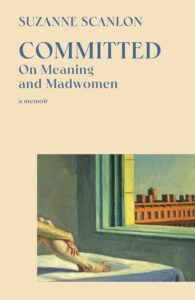
Suzanne Scanlon, Committed: On Meaning and Madwomen
Vintage, April 16
I’m a terrific fan of Janet Frame, and her own accounting of her “madness” leads you to believe there must be more to the brilliant minds afflicted with psychiatric pain. Scanlon uses her own experience being committed after her mother’s death to launch an investigation into the idea of the madwoman as a portkey. She delves into the work of Frame, Sylvia Plath, Virginia Woolf, Audre Lorde and other great thinkers labeled as mad women. –JM
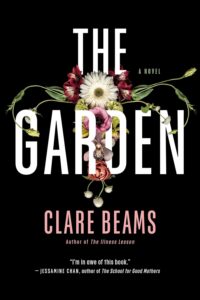
Clare Beams, The Garden
Doubleday, April 19
In 1948, Irene Willard retreats to an isolated house-cum-hospital in the Berkshires, run by a husband-and-wife team of doctors who are pioneering a cure for infertility. A secret garden with unknown powers can give these women everything, but in a page-turning, horror-infused turn, everything begins to crumble. Shirley Jackson meets The School for Good Mothers in Beams’s careful, beautiful prose. –EF
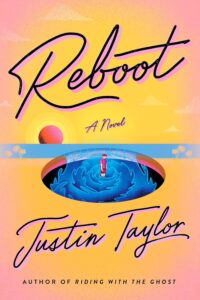
Justin Taylor, Reboot
Pantheon, April 23
In what sounds like a mash-up of Bojack Horseman and the January 6 insurrection, Justin Taylor’s latest novel sees a washed-up former child star try to get his old show rebooted—because who doesn’t love a bit of nostalgia?—while America slouches towards dissolution. Taylor is a fantastic critic with three novels and a memoir under his belt already, and this might be a strong contender for the emblematic novel that conveys the feeling of what it’s like to be online and alive at the same time. –SR
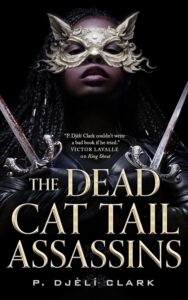
P. Djélì Clark, The Dead Cat Tail Assassins
Tordotcom, April 23
After an assassin job goes bad for Eveen, she has until the sun comes up to save her soul—and so a race across a festival-mad fantasy city ensues. Perfectly pitched to be read in just a couple sittings, Clark masterfully spins up an entire world and sprints through a swashbuckling plot without ever sacrificing character or nuance. Nobody does a Tordotcom novella quite like Clark: he’s an absolute master of the form, and this is no exception. –DB
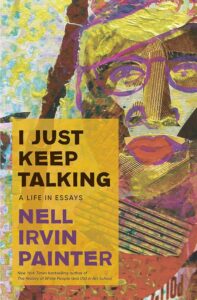
Nell Irvin Painter, I Just Keep Talking: A Life in Essays
Doubleday, April 23
Nell Irvin Painter is an essential critical voice who has written brilliantly about art, race and racism, identity, politics, and more. This collection of her essays—which also includes her own artwork—is a gripping and complex read. You’ll come away with a greater understanding of American history, Ralph Waldo Emerson, and Painter herself (among many other subjects). Something I rarely find myself saying about an essay collection: It’s a thrill from start to finish. –JG
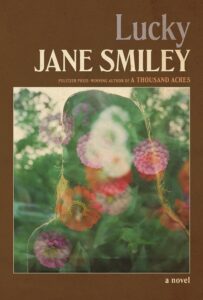
Jane Smiley, Lucky
Knopf, April 23
Lucky begins, like so many of Smiley’s novels, in the midwest, where Jodie Rattler grew up surrounded by a loving family before chasing her dream of becoming a singer to New York City. As Jodie gets closer to her dream, in the shadows of Joan Baez and Joni Mitchell, she has to decide if it’s the right dream. –JM
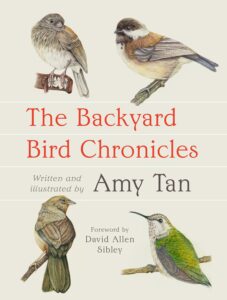
Amy Tan, The Backyard Bird Chronicles
Knopf, April 23
Simply add this to my pile of Margaret Renkl, Freida Hughes’ George, and Jenny O’Dell’s rendezvous with Crowson. If you promise me a witty birder book—birds as windows on life!!!—then great, and if the great Amy Tan is writing it, even better. The perfect antidote (with illustrations!) to whatever these past few years have been. –JM
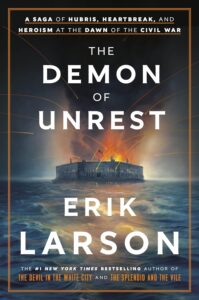
Erik Larson, The Demon of Unrest: A Saga of Hubris, Heartbreak and Heroism at the Dawn of the Civil War
Crown, April 30
One of the kings of narrative non-fiction turns his gaze to the five months between the election of Abraham Lincoln and the shelling of Fort Sumter that kicked off the Civil War. Lincoln and William Seward are major characters, as are lesser-known names like Major Robert Anderson, Edmund Ruffin, and Mary Boykin Chesnut—giving the book both a pulse-pounding political thriller quality and an on-the-ground look at life in a dangerously unsettled America. Warning: you might see some parallels to the present, and Larson urges you not to look away. –DB
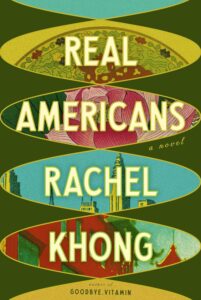
Rachel Khong, Real Americans
Knopf, April 30
I was a big fan of Goodbye, Vitamin, so I was thrilled to hear Rachel Khong has a new release upcoming—this one is different and heftier sounding than Vitamin, in that it spans three generations of a family, each attempting to understand their place within the family, and within the world they’ve been born into. By encompassing a family as a whole, the novel asks big questions about our lineage and futures, how much is really up to us, whether the fact of our pasts guarantee our fate, or whether we have agency over the lives we live. –JH
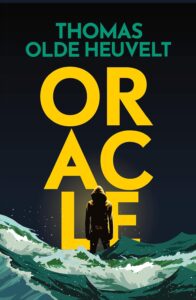
Thomas Olde Heuvelt, Oracle
Tor Nightfire, April 30
Olde Heuvelt’s Hex is one of the scariest books I’ve ever read, and apparently he’s bringing back that book’s supernatural investigator Robert Grim for another go-round, this time investigating a sailing ship that somehow ended up stranded in a field and with a propensity for disappearing those who climb aboard. If it’s half as scary as Hex, it’ll be worth reading during the brightening spring evenings instead of saving for the darker months. –DB
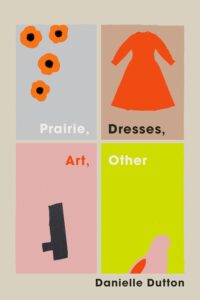
Danielle Dutton, Prairie, Dresses, Art, Other
Coffee House Press, April 24
The co-founder and editor of Dorothy, a publishing project, Danielle Dutton’s new book is “a haunting landscape of wildflowers, megadams, black holes, violence, fear, virtual reality, abiding strangeness, and indefinable beauty.” This is a book that defies categorization—a collection of stories, literary criticism, an essay on visual art and fiction, and stories-as-essays or essays-as-stories. I still think about Dutton’s novel Margaret the First, which was published almost a decade ago, and anticipate that this is one everyone will be talking about. –EF
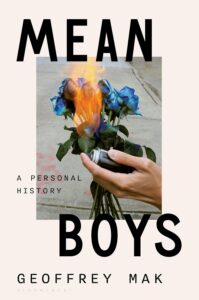
Geoffrey Mak, Mean Boys
Bloomsbury, April 30
“Edgelords all the way down” must have been a tempting subtitle for this collection of essays from Geoffrey Mak, one of my favorite contributors to Spike Art Magazine. Fortunately, there’s more to it than that: memoir meets cultural critique as Mak explores everything from the commodification of queer spaces to memes to fashion, and his youth as the gay son of an evangelical minister. –SR












